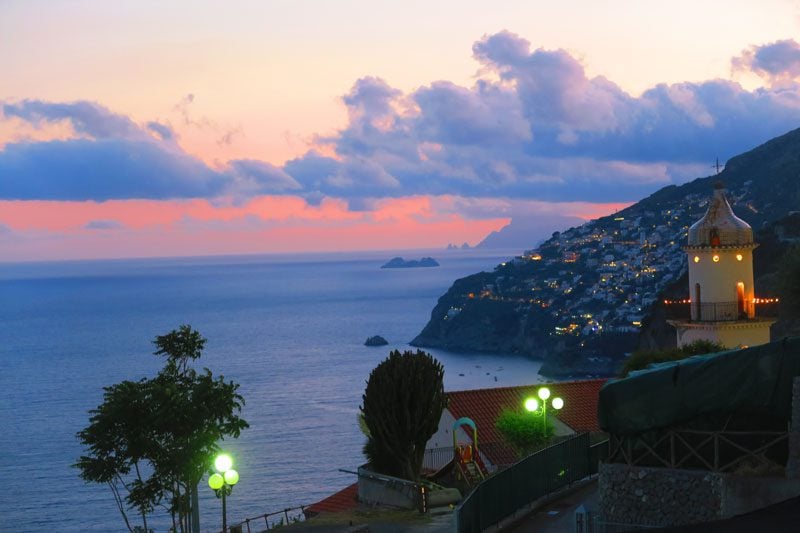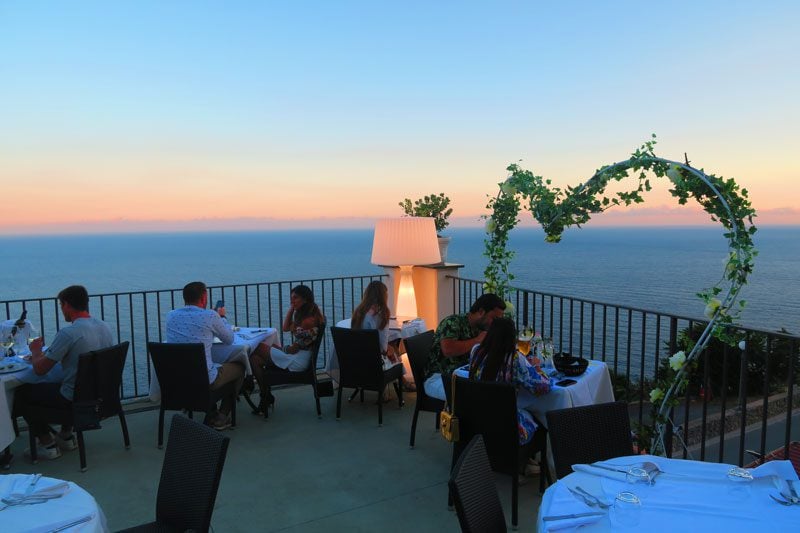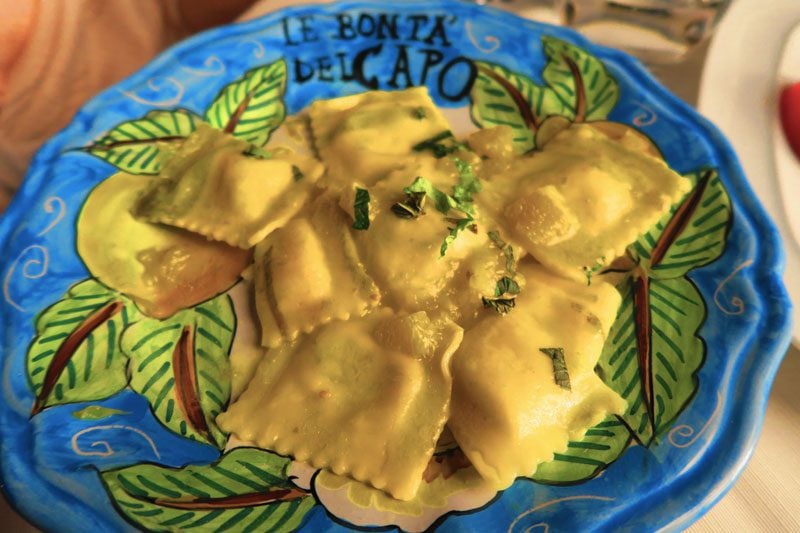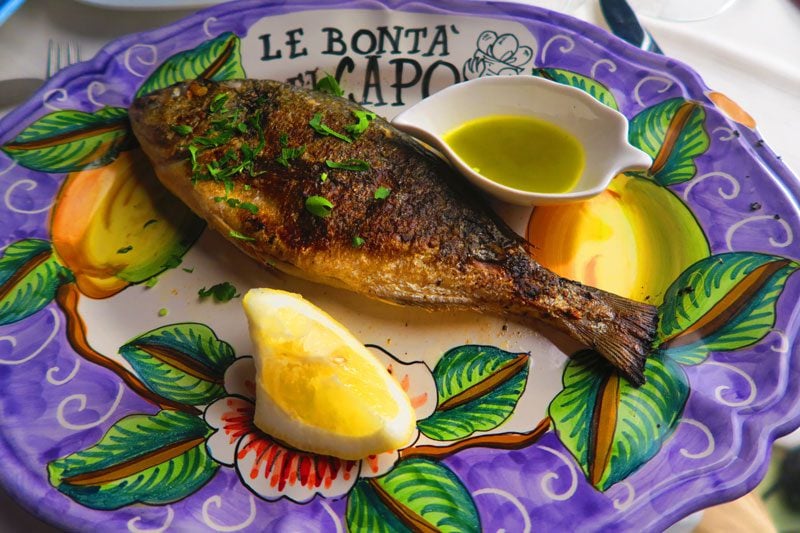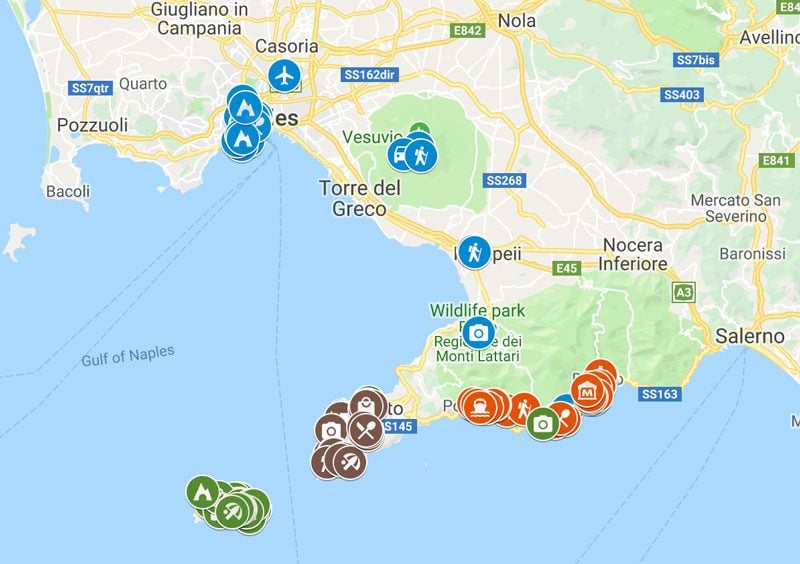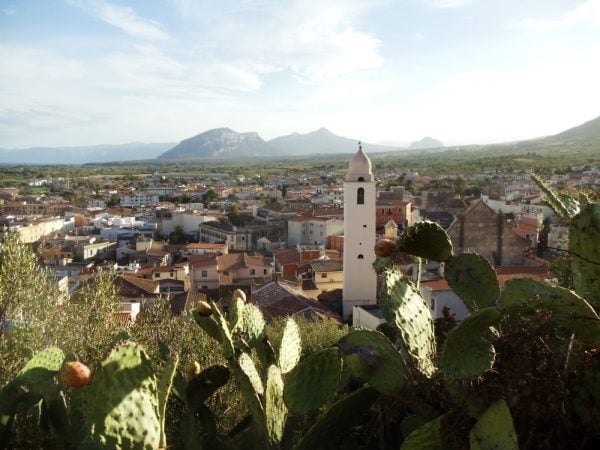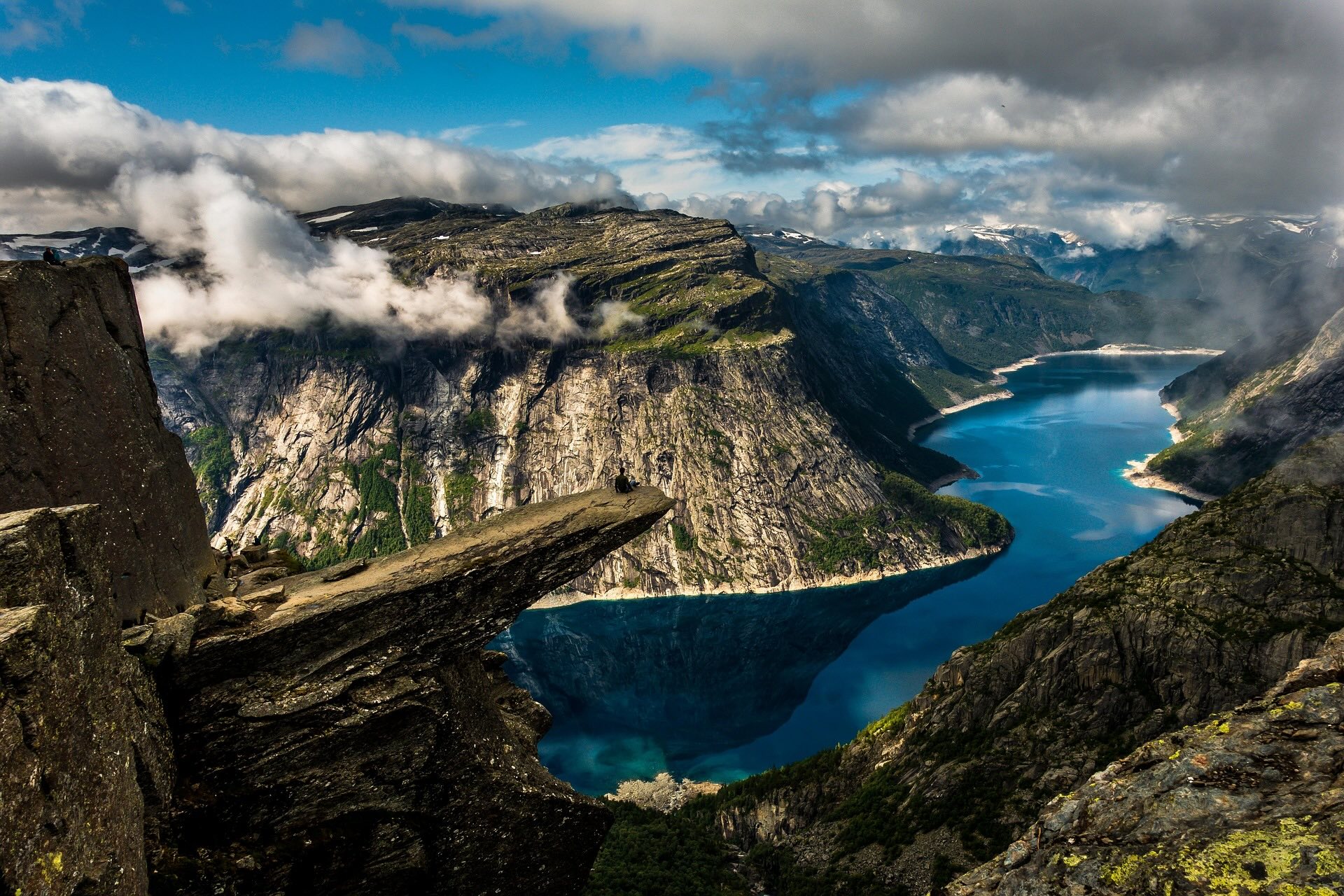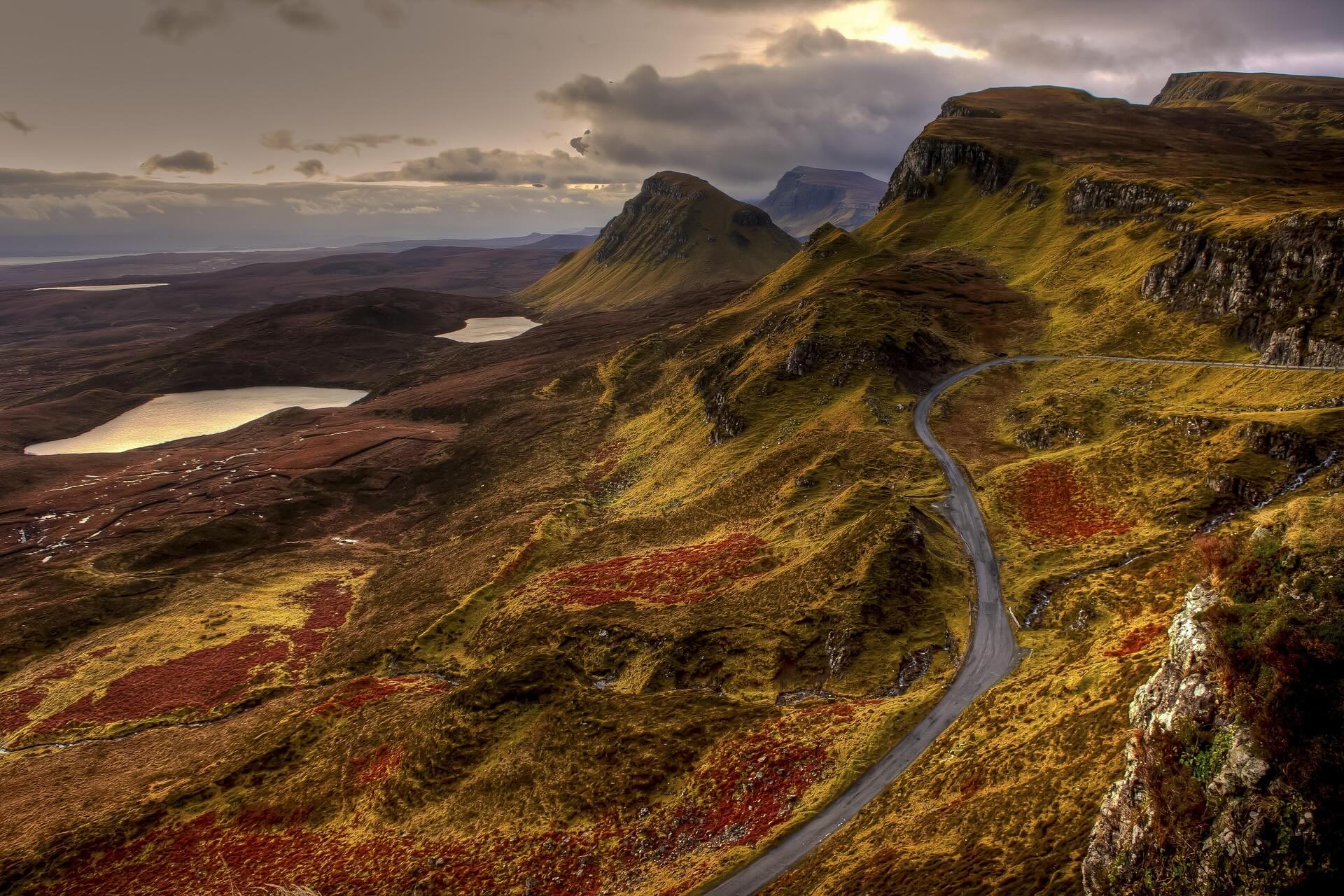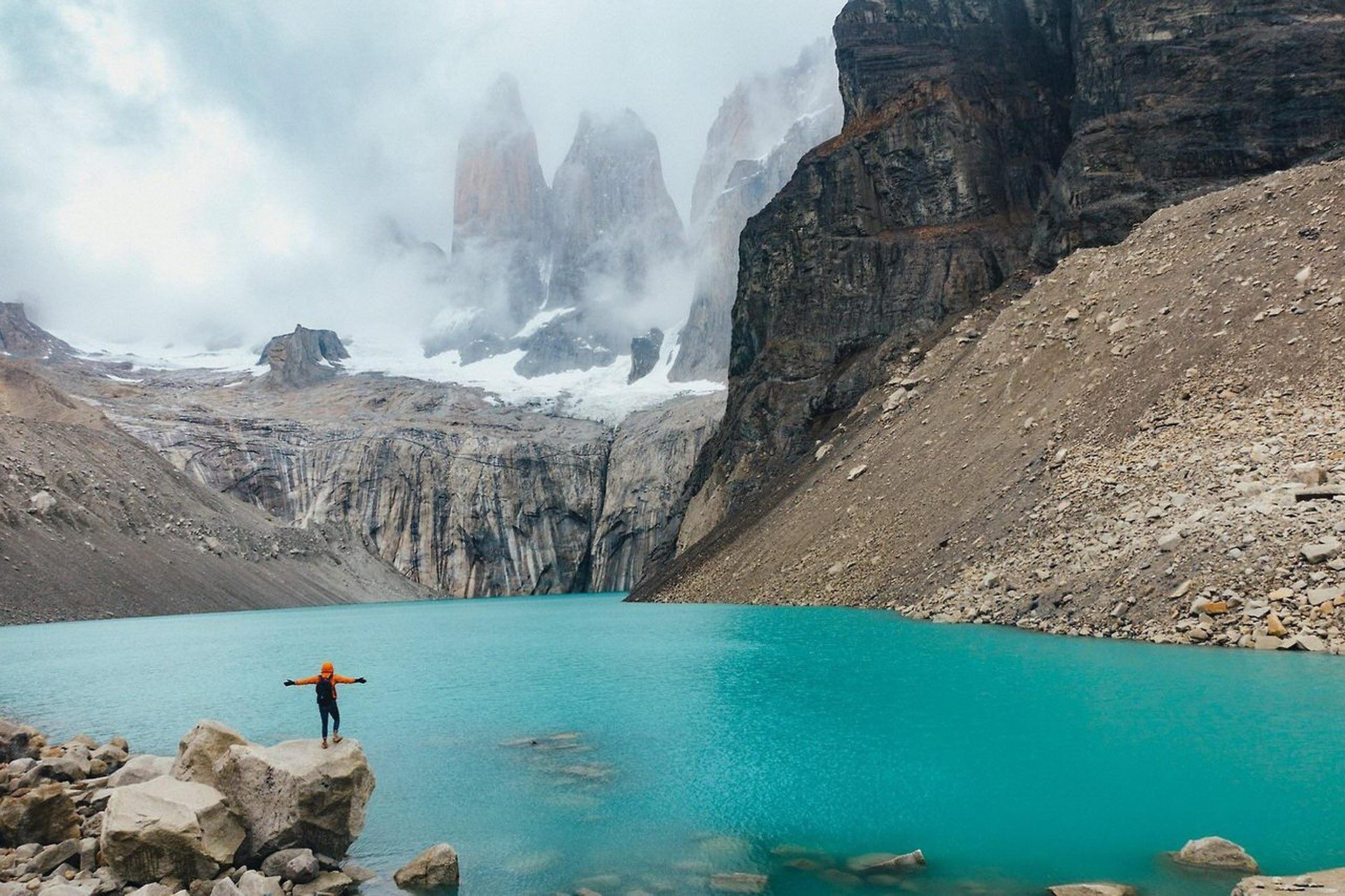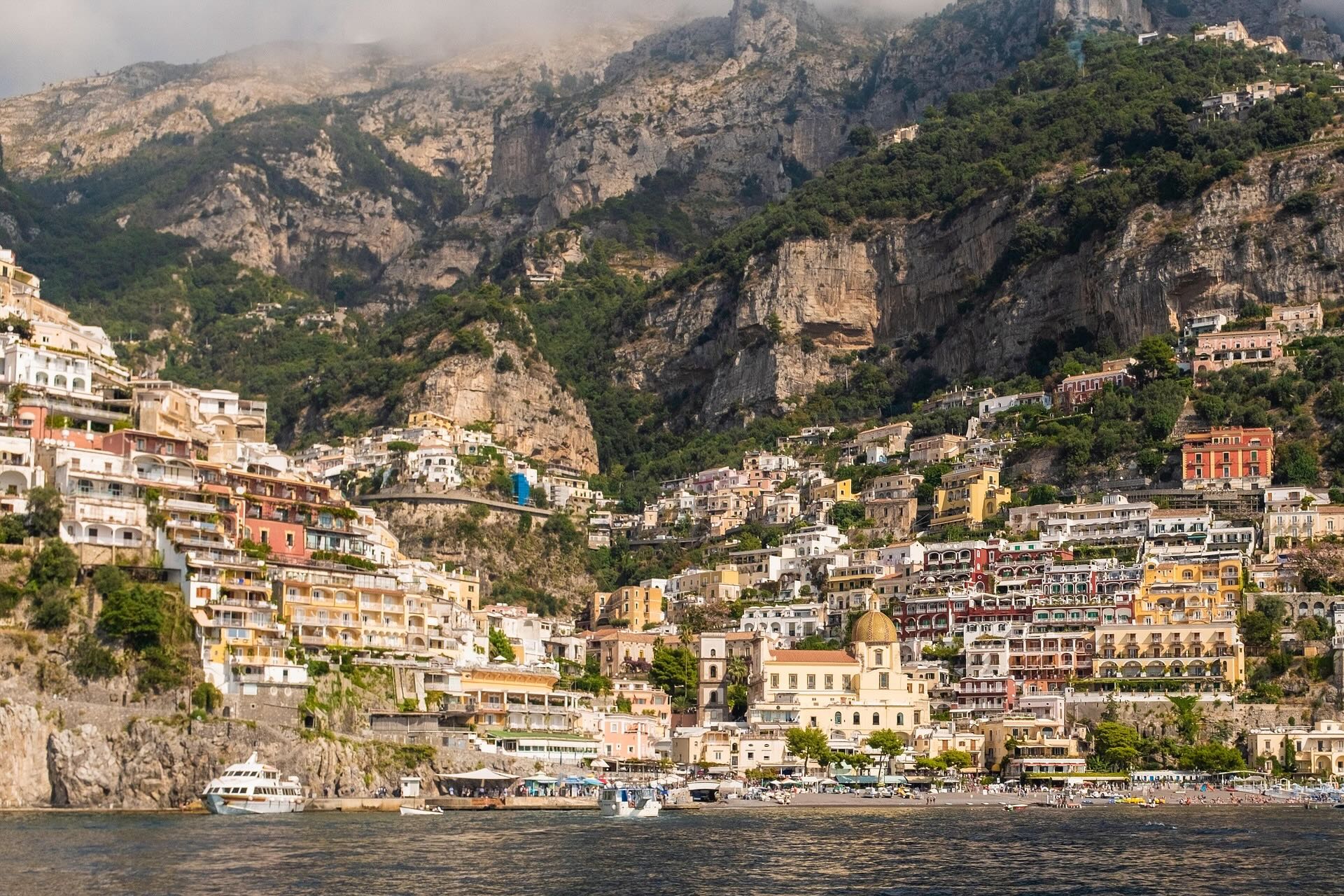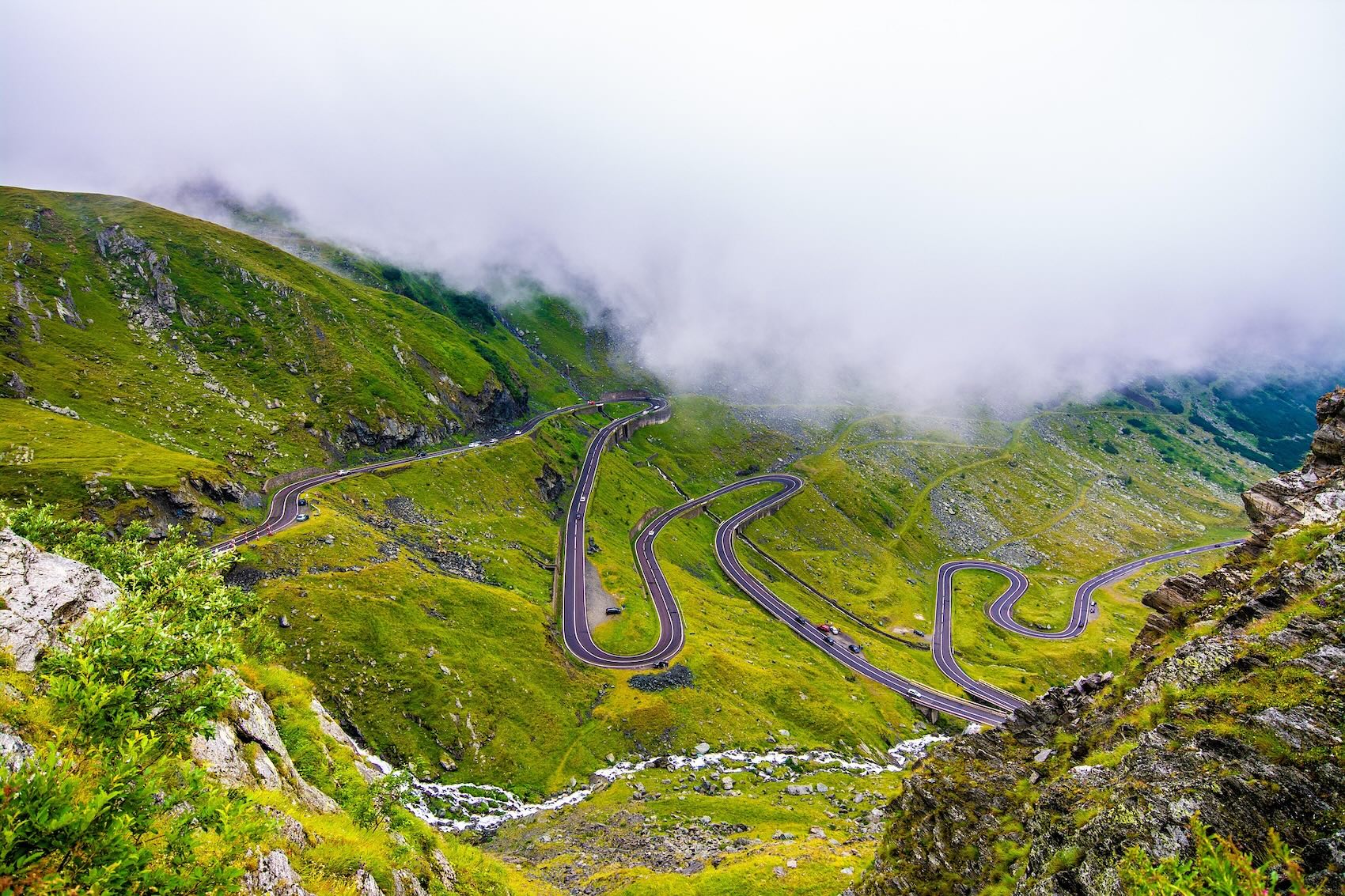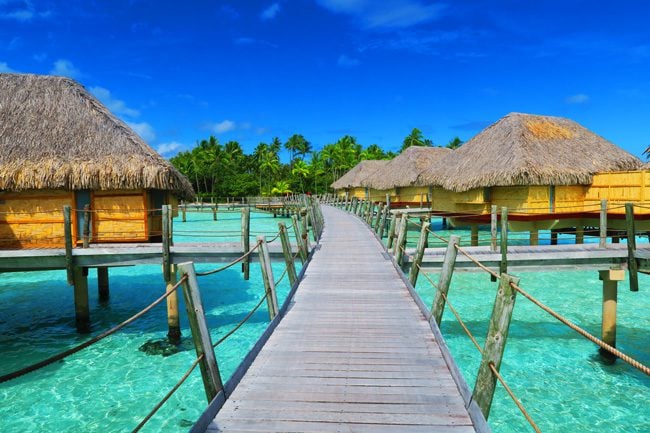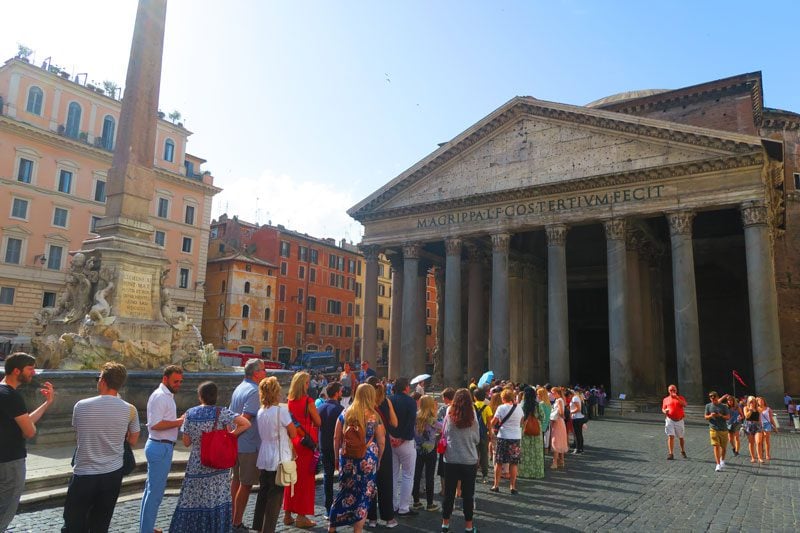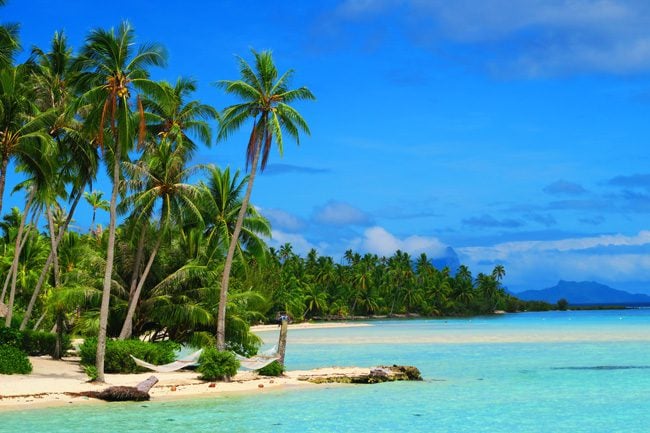7 Days in Naples and the Amalfi Coast Itinerary
Among Southern Europe’s most stunning coastlines, Italy’s Amalfi Coast evokes visions of deep blue meeting lemon-covered hills and villages hanging on for dear life. And though the region gets more than its fair share of visitors, the Amalfi Coast retains a glamorous allure that is simply too hard to resist. Add to the mix one of Italy’s most interesting and affordable cities, and you have yourself a recipe for a memorable holiday. Planning a week on the coast? Here’s a seven day Naples and the Amalfi Coast itinerary to spark your romantic getaway.
About this Guide
This week in Naples and Amalfi Coast itinerary is based on my own travels and extensive research. I visited the region at the start of June on a couple’s trip, and our preference was for active days filled with sightseeing, hiking, lots of walking, and great food. We focused less on beach bumming though we did visit a few of those as well.
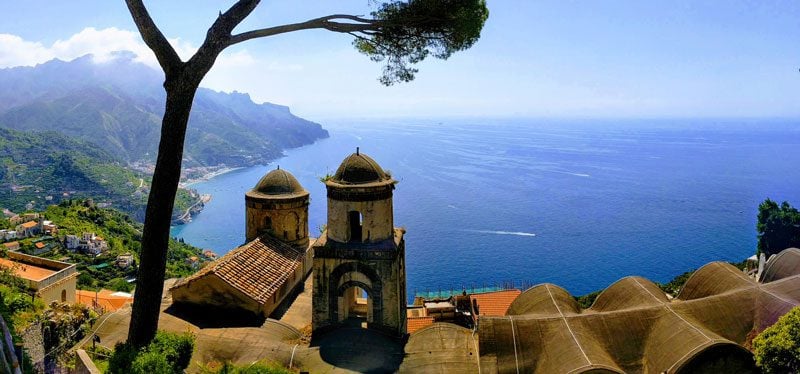
This itinerary contains several sections:
- Two Days in Naples, Vesuvius Volcano & Pompeii [Current Page]
- Two Days in Amalfi, Ravello & Positano
- One Day in Capri
- Two Days in the Sorrento Peninsula
- Top things to do in Naples & the Amalfi Coast
- Essential Naples & Amalfi Coast travel tips
7 Days in Naples & the Amalfi Coast Itinerary Map
This map contains all the places mentioned in this Amalfi Coast itinerary. Click on the image to open the map.
Part 1: Two Days in Naples, Vesuvius & Pompeii
Our 7 days on the Amalfi Coast itinerary begin in Naples, Italy’s third-largest city. Naples suffers from a bad reputation, and many tourists do their utmost to spend as little time here as possible. Sure, it might not be the cleanest city in the world, its dilapidated buildings might be in need of a touchup, and some of its Camorra-controlled sections are certainly a no-go zone for tourists.
However, Naples has so much charm that it would be a shame not to spend a little bit of time in one of Italy’s most historic cities. Following a quick visit, we’ll hit the road and climb the Vesuvius Volcano before exploring its “victim” – the ruined ancient city of Pompeii.
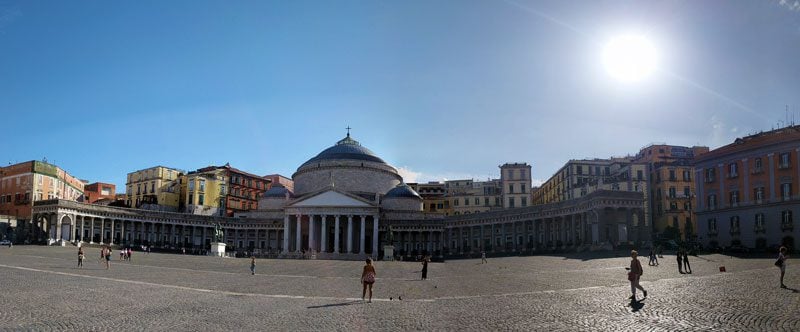
You can also start your Amalfi Coast trip closer to the region’s top highlights thanks to the upgraded Salerno Costa d’Amalfi Airport, thus skipping Naples.
Naples Travel Tips
This section of the Amalfi Coast itinerary highlights specific travel tips for planning your Naples visit. Also, explore general Amalfi Coast travel tips if you plan to get out of the city.
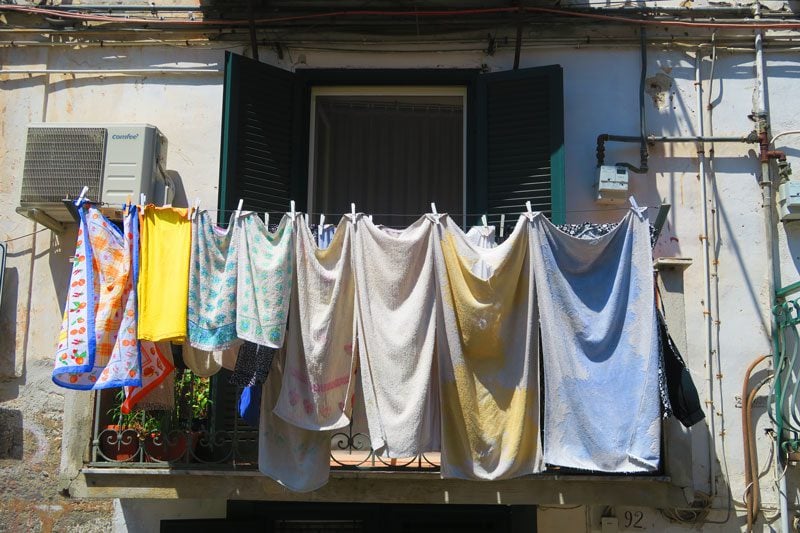
Where To Stay In Naples?
Sleeping smack in the historic center – the Centro Storico – will be challenging, so I recommend looking for something “in the perimeter”.
We spent a night at A Cassa di Mamma, a charming bed and breakfast located about 15 minutes on foot from the historic center. From the moment we met our hosts – Marina and her son – we knew we made the right choice. Speaking excellent English and doing everything possible to make your Naples visit a memorable one, this accommodation is perfect for both couples and families who seek interaction with locals.
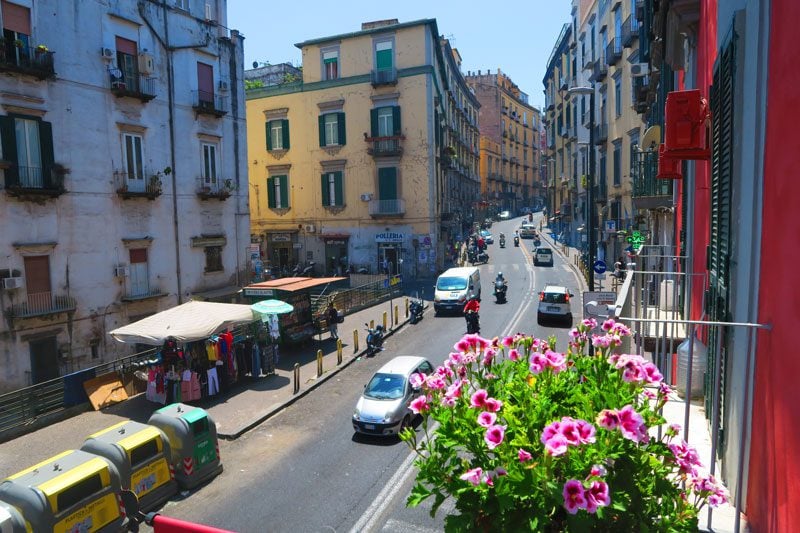
A Cassa di Mamma is situated in one of those “classic” Naples apartments, one with an antiquated feel, an elevator that might not be working, and windows overlooking the busy street traffic (you’ll sleep like a baby, so not to worry). Rooms are quite large and air-conditioned, the shower works just fine, and a typical breakfast is offered with a never-ending flow of coffee. Another advantage to A Cassa di Mamma is its proximity to a parking garage where the owners know Marina, which provided us with the extra confidence of trusting our car (and keys) in the hands of strangers.
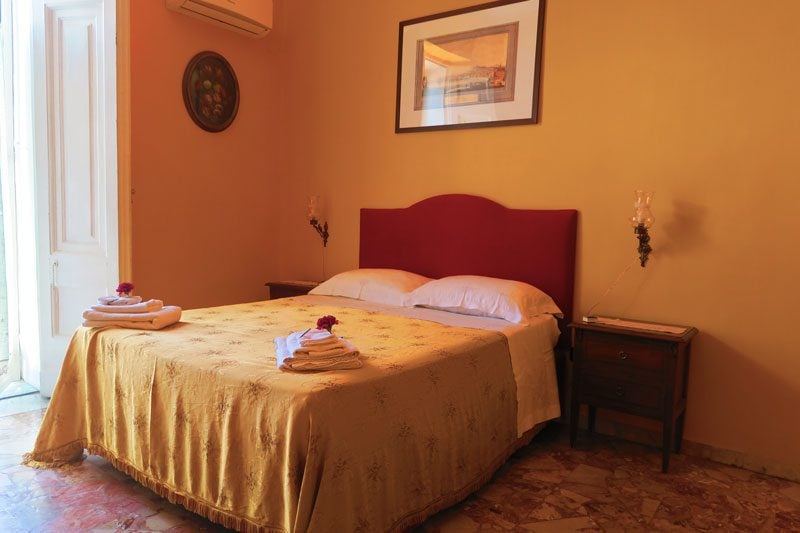
Day 1: Naples
After checking into our bed & breakfast, we geared up for nearly a full day of exploring the city on foot, from the grid-like streets of the Centro Storico down to the marina via the downtown boulevards. We ended the day after walking 15 km, well deserving our evening pizzas.
Via Port’Alba
Walk along Via Port’Alba, the official gateway to the historic center of Naples. The entrance to this tiny street is via a stone gate, and the highlights here are the books… there are lots of them. Via Port’Alba is known as “the library street”, with a handful of antique bookshops lining both sides and a few stalls taking up space in the middle. Some shops also double as cafes and bars.
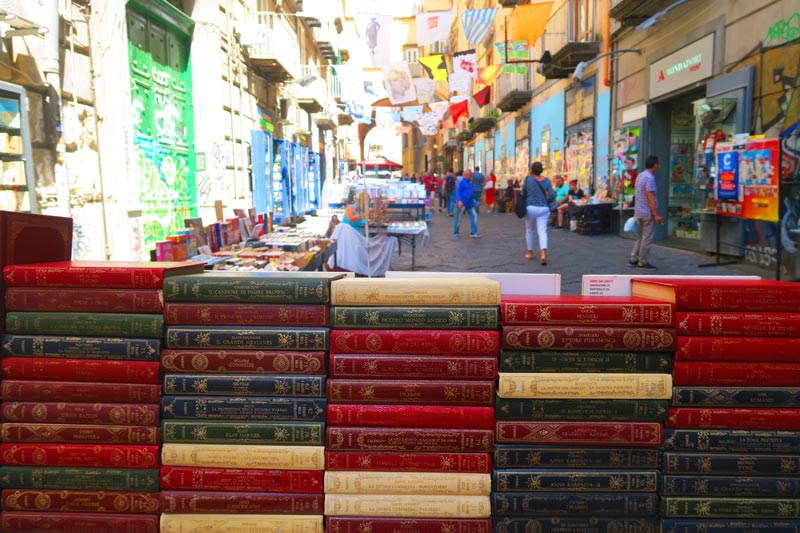
Piazza Bellini
Piazza Bellini is the de facto entrance to the Centro Storico and its two major streets: Via dei Tribunali and Via San Biagio dei Librai. Piazza Bellini is quite small and offers some seclusion from the city’s hustle and bustle. You’ll find here a few cafes and some Roman ruins. Parallel to Piazza Bellini lies a large municipal square – Piazza Dante – but there isn’t much happening here apart from the odd evening musical performance.
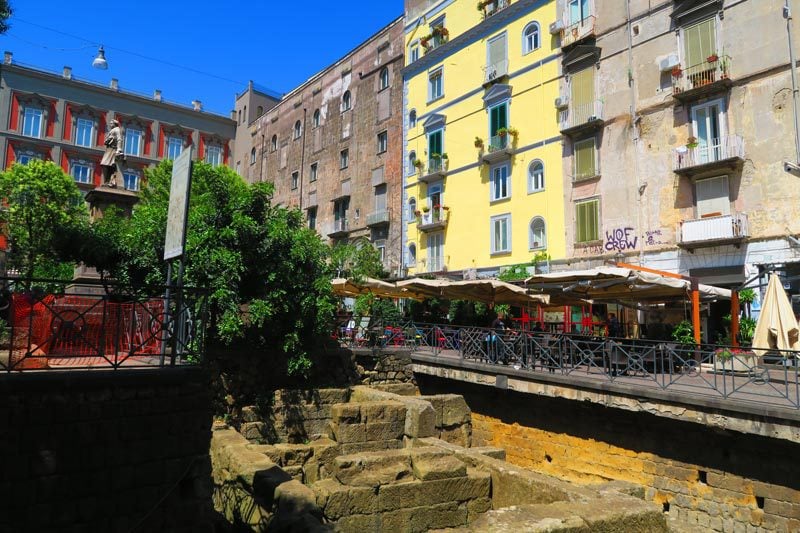
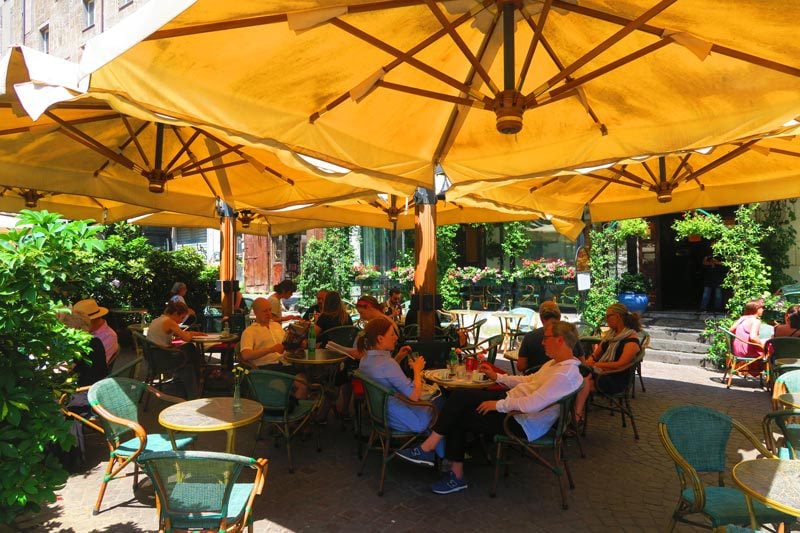
Piazza San Domenico Maggiore
Approached from Via dei Tribunali, the Piazza San Domenico Maggiore can hardly be missed, mainly thanks to the large obelisk taking up center stage. The obelisk was erected in the mid-17th century to celebrate the city’s deliverance from a terrible plague.
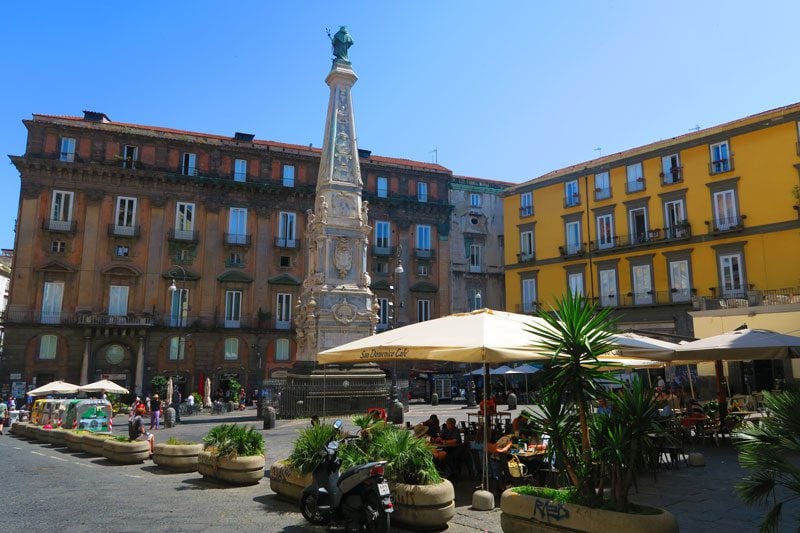
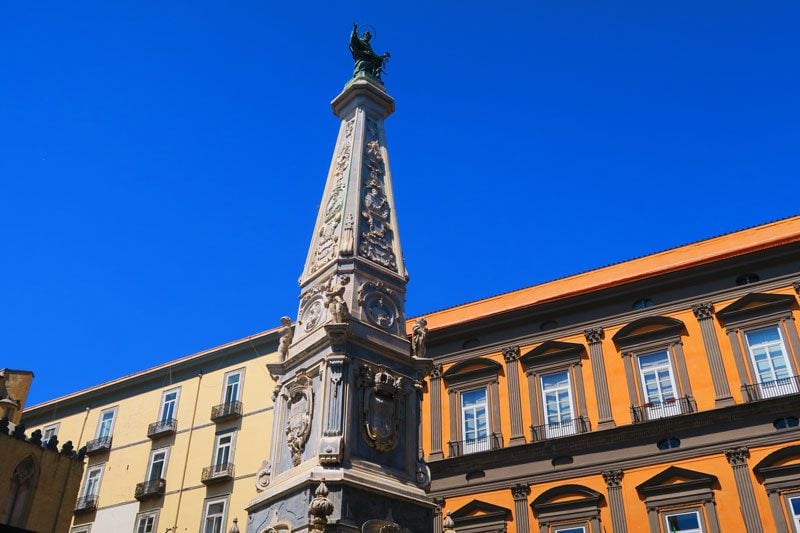
Coffee Break
Not to be missed is the Scaturchio chocolate and pastry shop, one of the city’s most famous. You can order at the counter or sit outside, but whatever you do, try the ministeriali – essentially a slice of hard chocolate injected with rum-flavored cream. We also ordered a “side” of delicious cannolis and washed everything down with shots of espresso.

Last but not least, visit the church which this piazza is named after. The San Domenico church was a surprising and awe-inspiring visit. It looks nothing fancy from the outside, but once you step inside, it’s a totally different ball game. Originally dating back to the 13th century, the church’s incredible colors and magnificent ceiling are not to be missed.
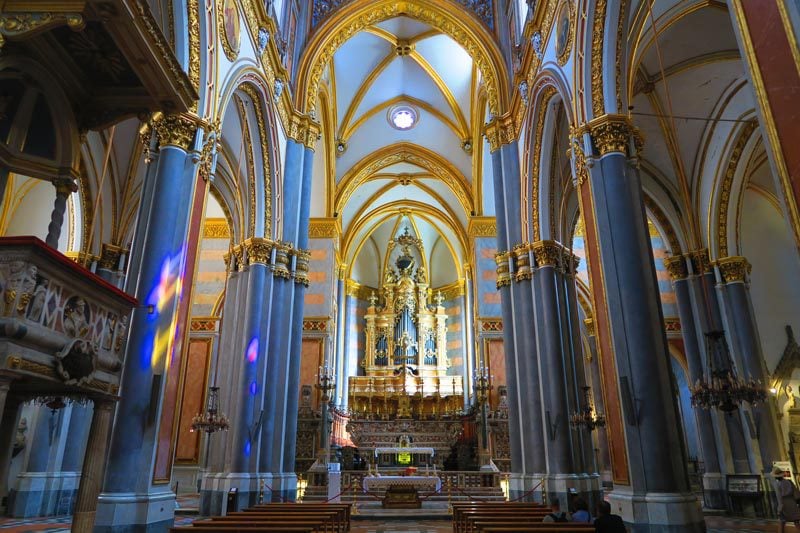
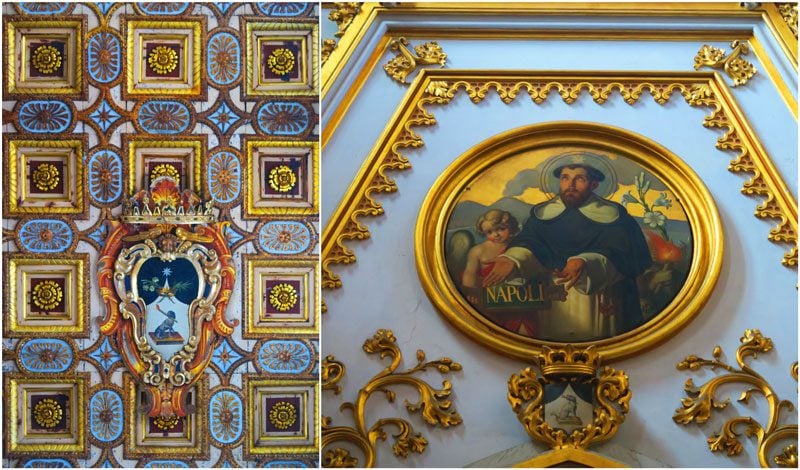
Via dei Tribunali
This is the historic center’s “main” street, a narrow thoroughfare where pedestrians, cars, and scooters must share the scarce real estate. This is the Naples you’ve imagined: narrow, hardly any sunlight making it through the tall, crumbling buildings, narrow alleys crisscrossing from either side and lots of action. We’ll come back later to this area for dinner, but if you’re after some lunch, there are plenty of options around.
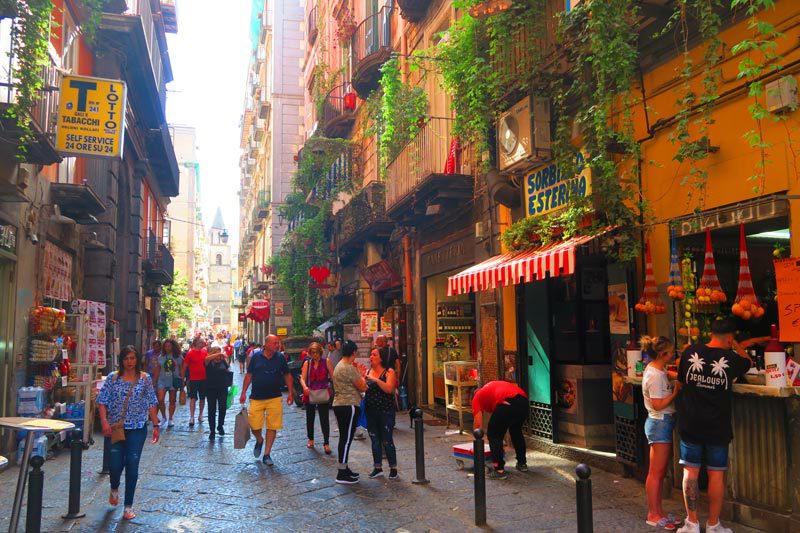
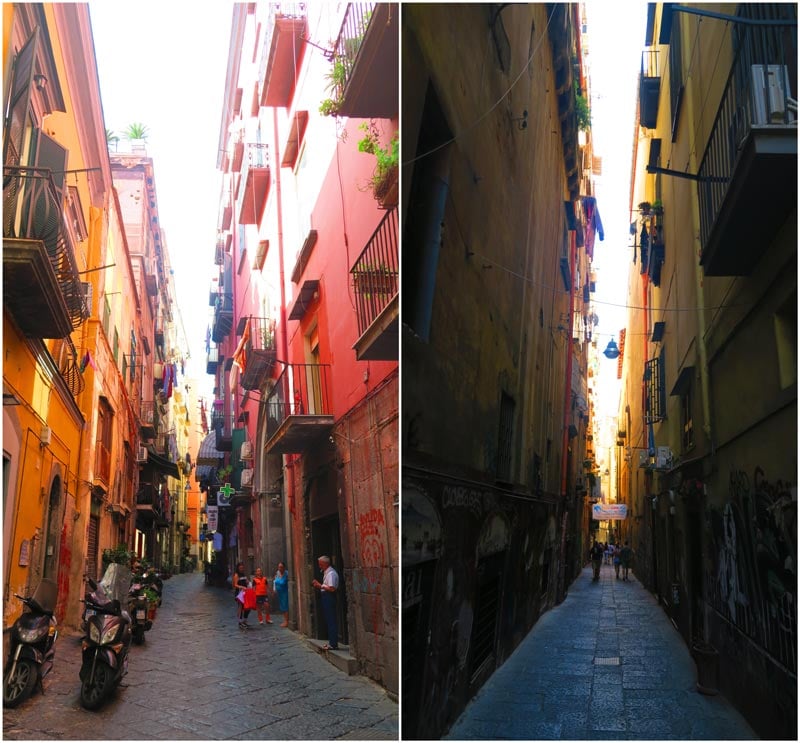
Museo Cappella Sansevero
We meandered along on foot until finally pinpointing the Sansevero Museum. Though you do have to pay a small entrance fee (discounts for under 24s and seniors) and you absolutely cannot take photos inside, it’s well worth the visit. Dating back to the late 16th century, the museum is blessed with the most exquisite interior in Naples.
The museum’s centerpiece is the world-famous marble statue of Jesus. The statue was carved from a single piece of marble, and the incredible level of detail is something that you must see with your own eyes. Lining the perimeter are other marble statues and tombs, while the chapel’s ceiling is, once again, something out of this world. The person responsible for this incredible collection was also a local alchemist; some of his chilling work is displayed in the basement.
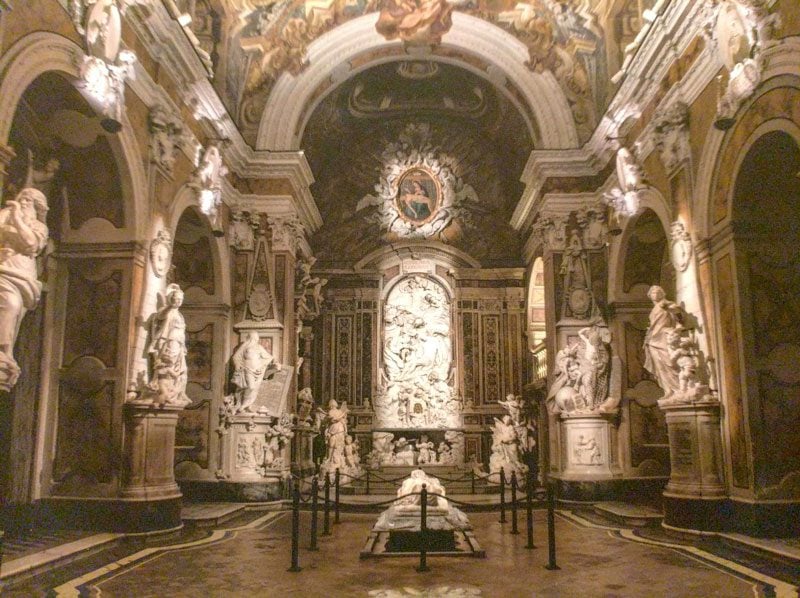


The Duomo
Free to enter, there’s no excuse for not visiting the prime cathedral of Naples, though be warned – you must have your shoulders covered! Built in the 18th century, the cathedral is dedicated to the patron saint of Naples and the man responsible for the city’s greatest mystery – San Gennaro.
The martyred saint was killed in the year 305, and when his body was later transferred to the cathedral, what was left of his dried blood liquified in the hands of the bishop. The miracle of San Gennaro is celebrated each year during the month of May and is certainly a topic worth further exploring if you want to learn more about the superstitious side of Naples.
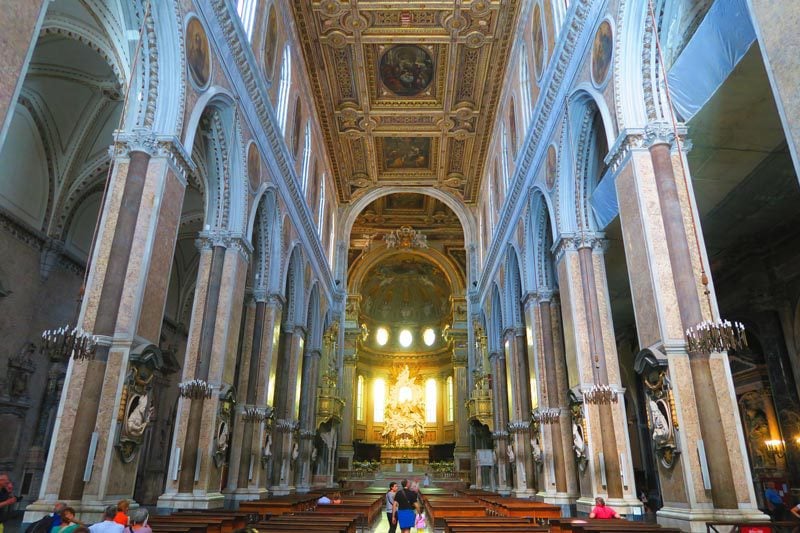
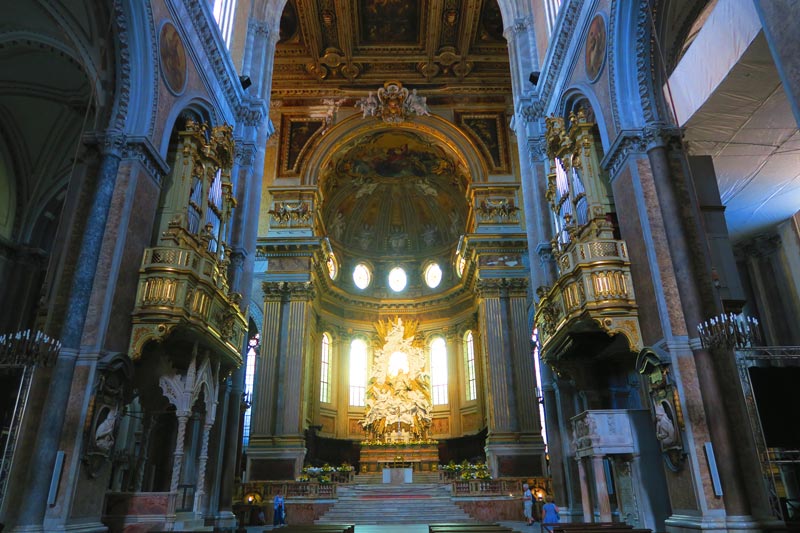
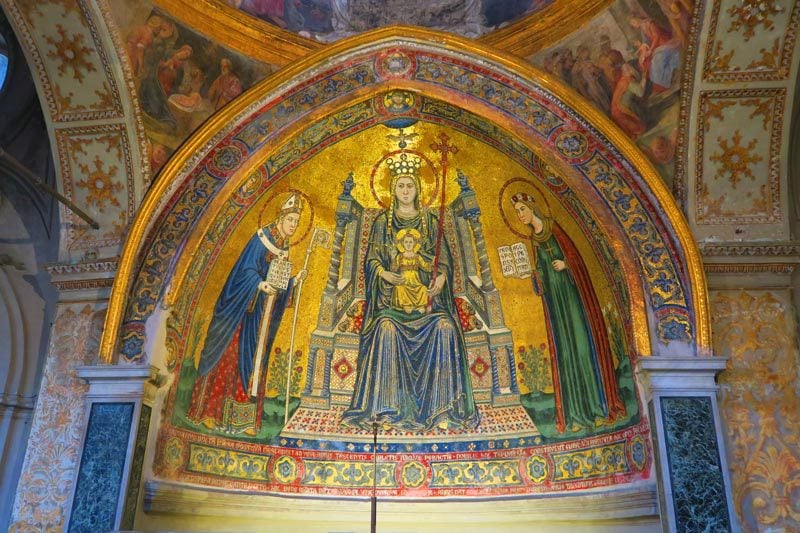
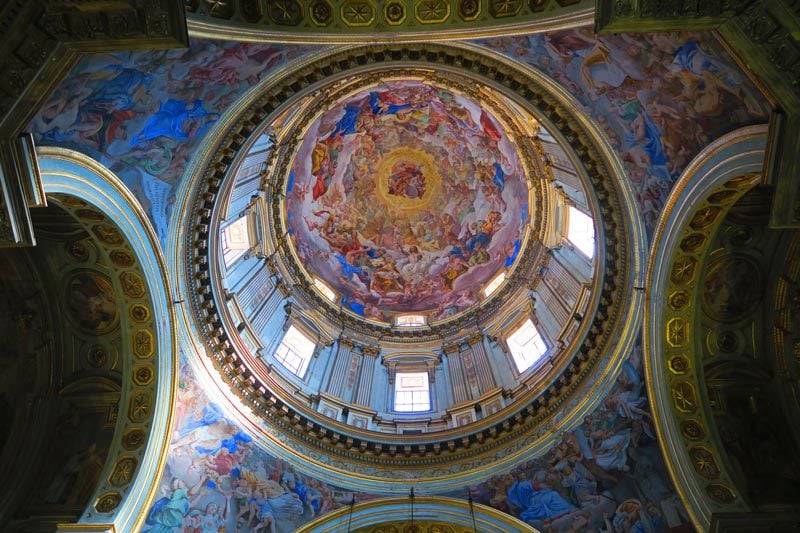
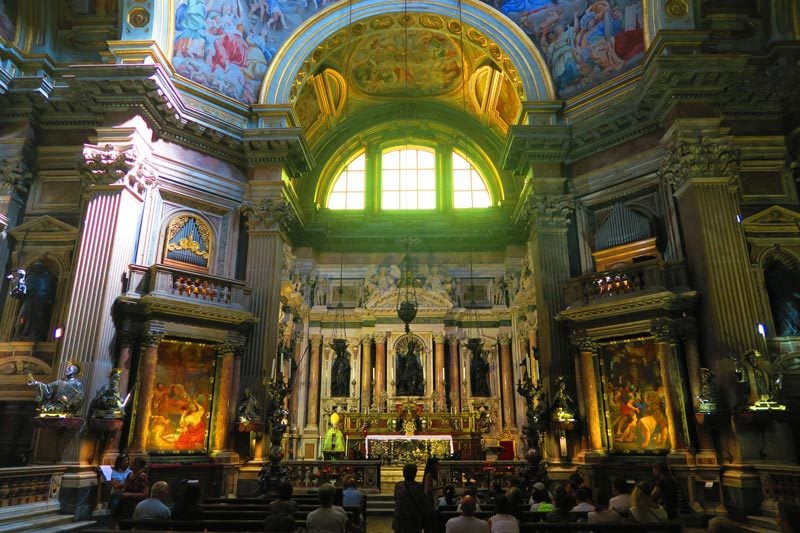
Piazza San Gaetano
On the way back from the Duomo on Via dei Tribunali, we climbed the steps of this church for a unique vantage point over the historic center’s major street. From up here, we glanced for a while at the mix of tourists walking by and locals going about their daily chores.
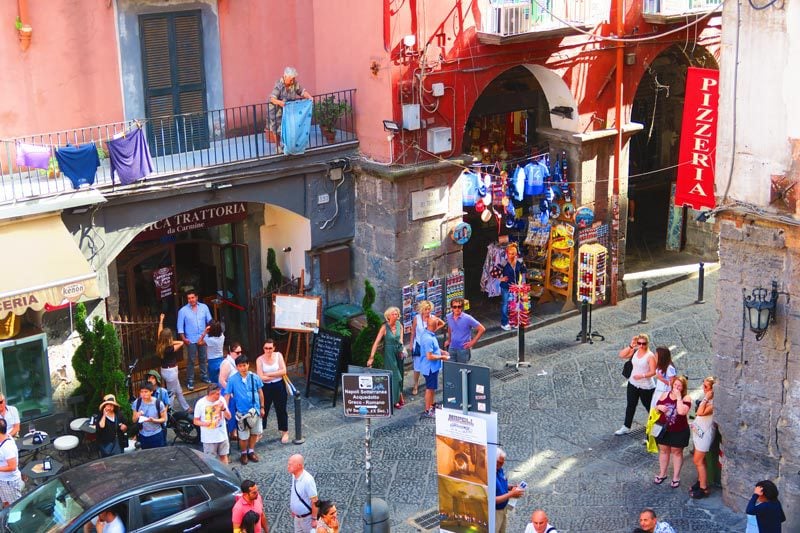
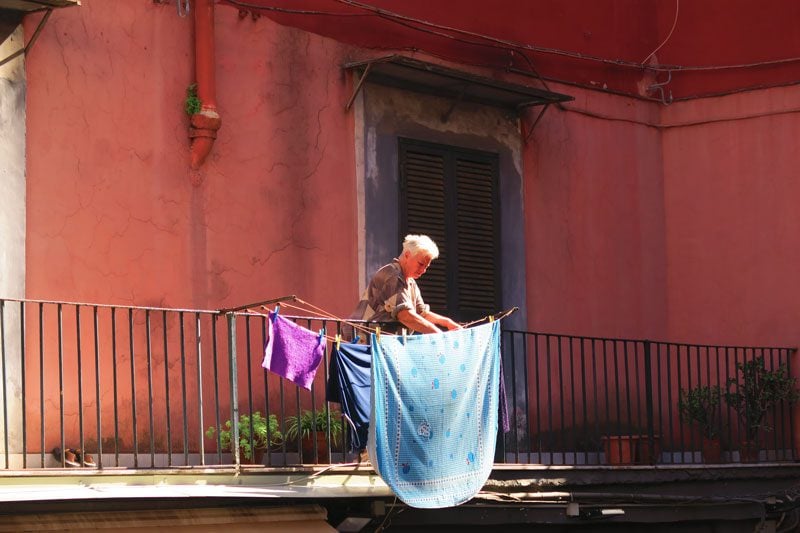
Via San Gregorio Armeno
Right after Piazza San Gaetano, we turned on Via San Gregorio Armeno before exiting the historic center through the less exciting Via San Biagio dei Librai. Via San Gregorio Armeno is one of the prettiest streets in Naples and is famous for shops selling Christmas decorations throughout the year.
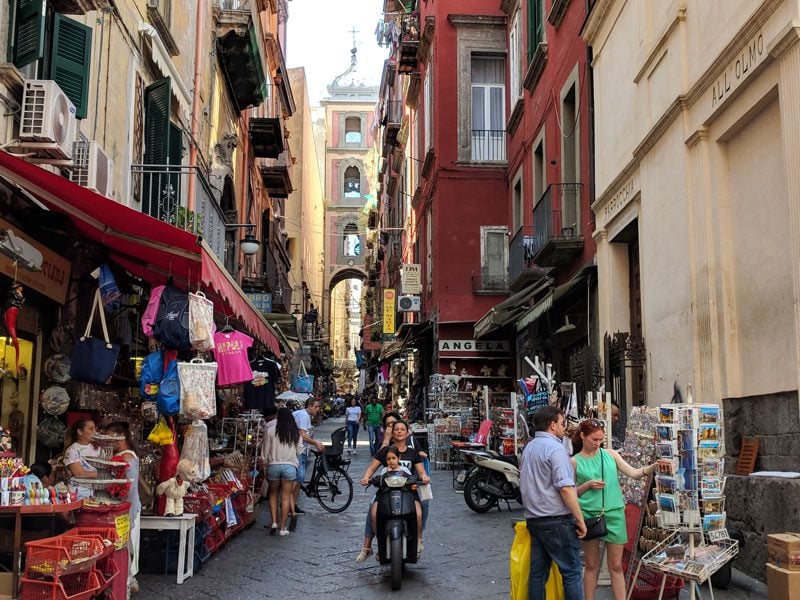
If you still fancy getting blown away by the over-the-top interior of classic European churches, step inside the Gesù Nuovo church whose exterior facade can’t be missed.
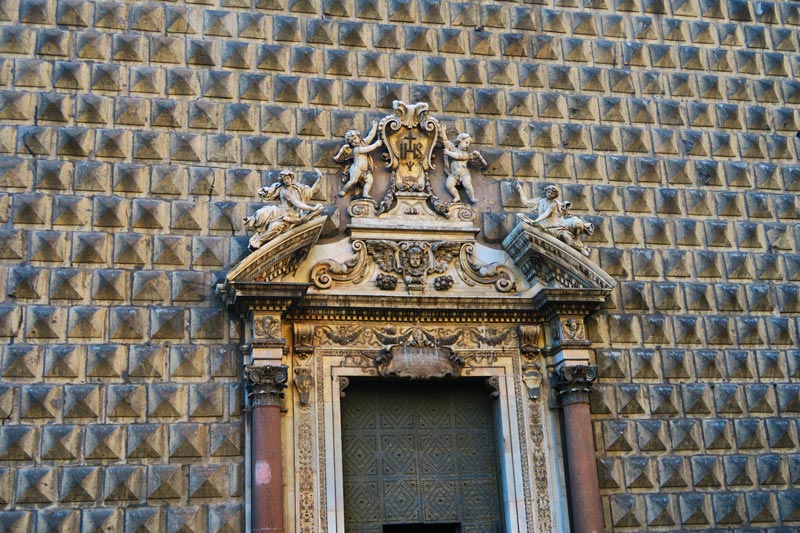
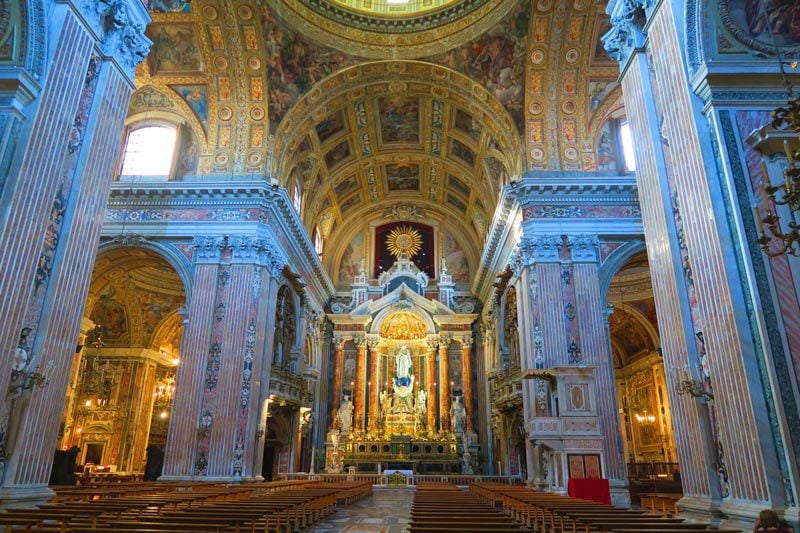
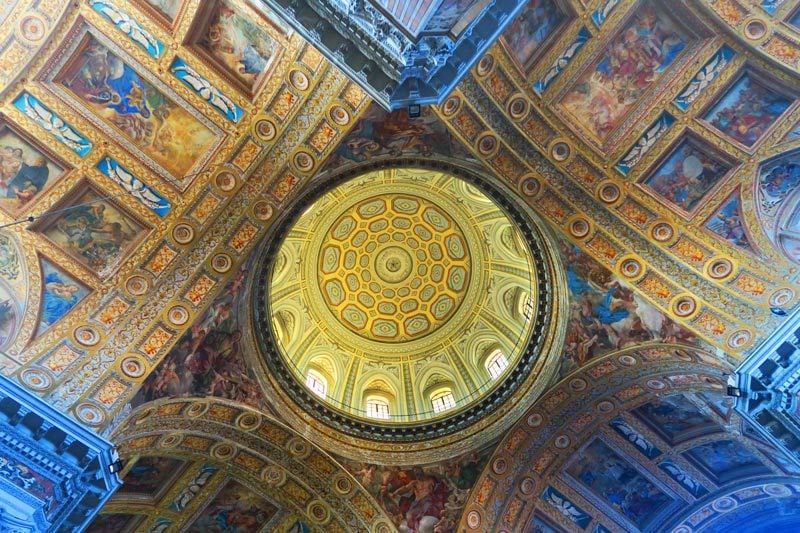
Via Toledo
Via Toledo is the central avenue in Naples, the city’s main artery, and a pleasant way to go from the historic center to the sea. As you make your way down, there are several worthwhile stops, and you’ll need to spare extra time for the dozens of shops lining both sides of the avenue. Also worth noting are the small alleys rising from the avenue’s western side. These make up part of the grid of the Spagnoli Quarter. It makes for a pleasant walk that would only take about 20-30 minutes without stops.
One of the landmarks along the way is the Galleria Umberto I, an impressive shopping arcade topped with a glass ceiling. In recent years, the arcade has gotten a facelift and is now a favorite shopping and dining spot for locals. If you have the extra time (or if it’s raining in Naples), the Castel Nuovo is just a few minutes by walk from Galleria Umberto I.
This 13th-century castle is now the city’s main museum. Another worthwhile stop is at the Via Toledo branch of Il gelato Mennella, a local chain of ice cream parlors. They’ve been around since 1969 and I must say it was one of the best ice creams we tasted on this trip!
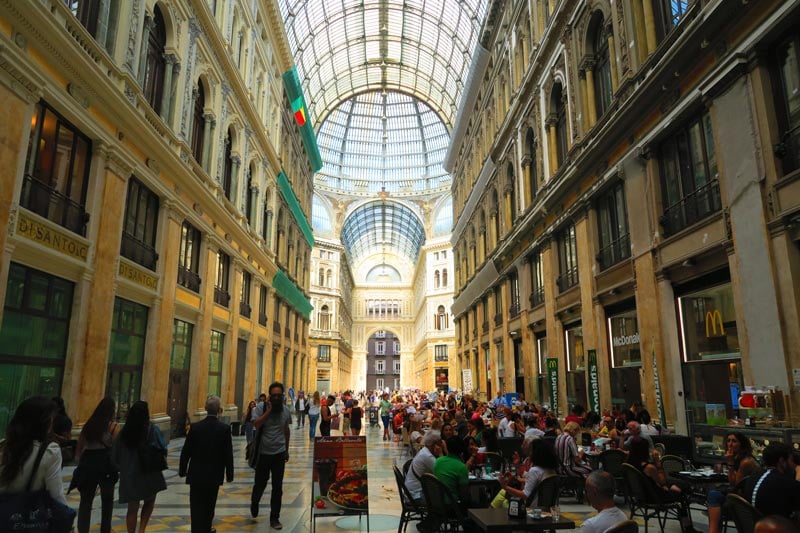
Further down Via Toledo is Piazza Trieste e Trento and the Teatro di San Carlo. This is the largest and oldest opera house in Italy and you can either attend an evening show or tour the building. Across from Piazza Trieste and the opera house is Gran Caffe Gambrinus. Over the years of traveling in Europe, I came to learn that every large city with a bit of history has its classic cafe and in Naples, this is the one. The cafe was founded in 1860 and is famous for its pastries and ice creams. With waiters dressed in their finest outfits, you can either down an espresso over the counter or grab a seat outside and watch the world go by.
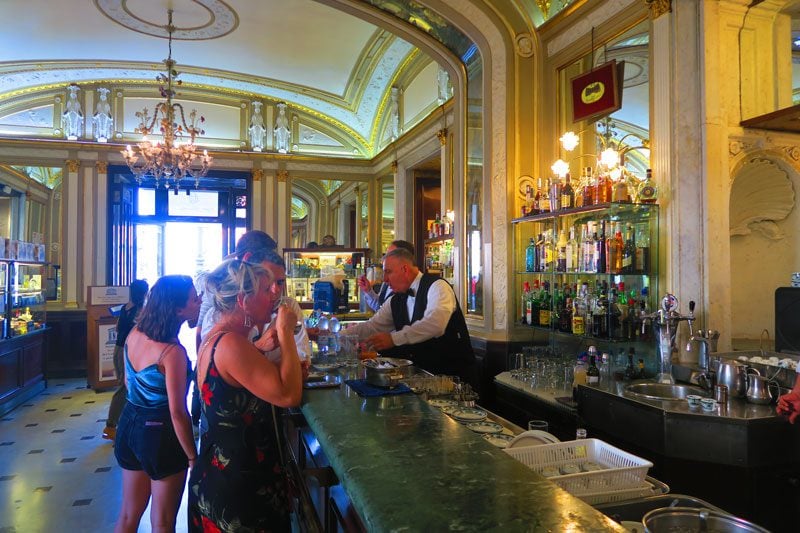
Piazza Del Plebiscito
This marks the end of Via Toledo and is Naples’ main square. Its size is certainly out of the ordinary in cramped Naples but there isn’t much happening here apart from admiring the architecture and enjoying the occasional live show. From the Piazza, you can detour to the Castel Nuovo – a 13th-century fortress that now houses the Civic Museum.
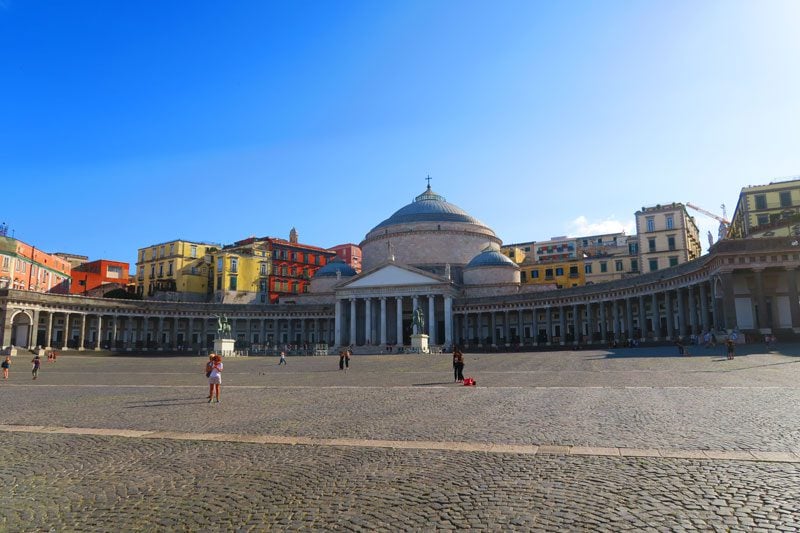
The Waterfront
If you’ve got more time, consider heading straight down to the waterfront and catching awesome views of the Vesuvius Volcano. There are also a few paths that can extend your walking tour.
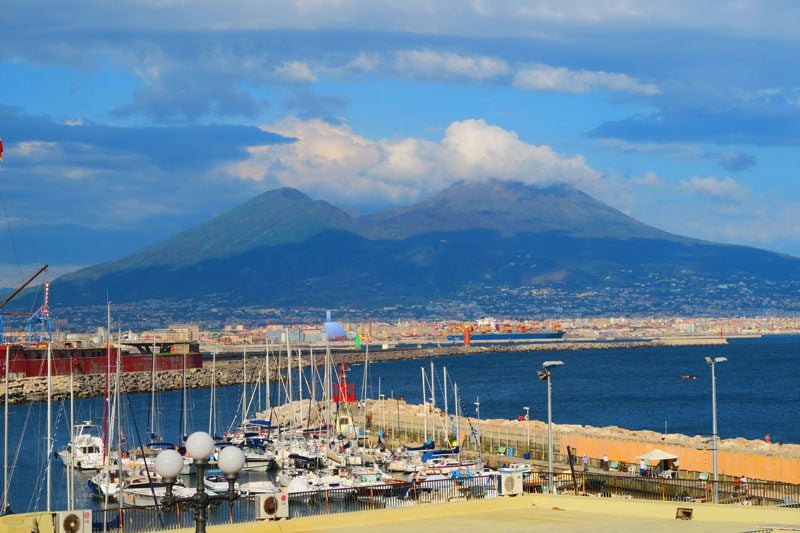
Pizza Dinner in Naples Historic Center
On this day, one of the biggest questions on your mind will no doubt be, “where can you find the best pizza in Naples?” Well, I must say there were many candidates but they were all very much geared towards tourists (accordingly was the wait in line). There was Gino e Toto Sorbillo – famous among celebrities and the simpler Pizzeria I Decumani.
However, we simply asked our lovely host – Marina – and she told us that wise locals head to Pizza di Matteo instead. She was absolutely right, as there were quite a few locals inside. The over was firing pizzas by the dozens and the taste was great, soft at the center, and only really baked at the edges – a classic pizza Napoletana.


If you’re seeking to dine outside the tourist hot spot of the historic center, consider the Regina Margherita, Signora Bettola or Antica Pizzeria Del Borgo Orefici
Exploring Underground Naples
Since the time of the ancient Greeks, the ground beneath present-day Naples is dissected by a maze of tunnels and caves. Due to the relatively soft tuff – which is essentially compressed volcanic ash, the ground was ideal for excavation. Over the years, these caves were used as cisterns, ancient Roman theatres, escape routes, bomb shelters during WWII, and burial grounds – much like the catacombs of Paris.
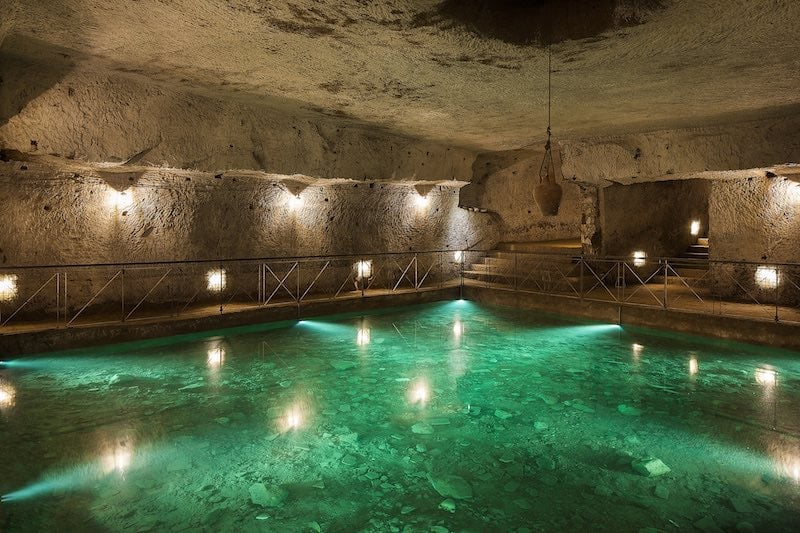
There are several routes in the Naples underground. The popular ones are the Naples Underground in the historic center and the famed Bourbon Tunnel with its remnant antique cars. However, our host recommended the Catacombs of San Gennaro and the Catacombs San Gaudioso as better alternatives. In the interest of time, we opted out of heading underground.
Day 2: Vesuvius Volcano, Pompeii & Drive to Amalfi
On day two of our week on the Amalfi Coast itinerary, we finally head to the actual coast. We’ll start the day scaling the mighty Vesuvius Volcano before exploring the ruins at Pompeii. Our day ends with a beautiful drive to our base for the next few days around Amalfi and a romantic dinner to celebrate the “official” beginning of the trip.
Driving is usually the best way to explore a region at your own pace. However, be sure to catch up on the latest driving restrictions along the Amalfi and Sorrento coasts and when they apply. Here’s a companion guide for planning a trip to the Amalfi Coast, including driving tips.
Visiting Mount Vesuvius from Naples
Clearly seen from Naples, the sight of the mighty Mount Vesuvius volcano (1,281m) is a constant tease and a hard-to-resist opportunity to scale an active volcano in the heart of Europe. Since erupting in 79 AD and destroying Pompeii, Vesuvius has been a constant threat and is expected to erupt in the coming decades.
If it’s a completely overcast day, consider skipping the visit to Vesuvius in favor of more time in Pompeii and/or the surrounding archeological sites. Visibility at the top will be minimal.
Driving to Mount Vesuvius from Naples takes about 30 minutes, but have lots of coins handy as the motorway is tolled in several sections (you can also take a bus from Naples). As you head up to the summit, the road snakes around the volcano. The scenery constantly changes with every bend, and there are a number of panoramic spots overlooking the Gulf of Naples.
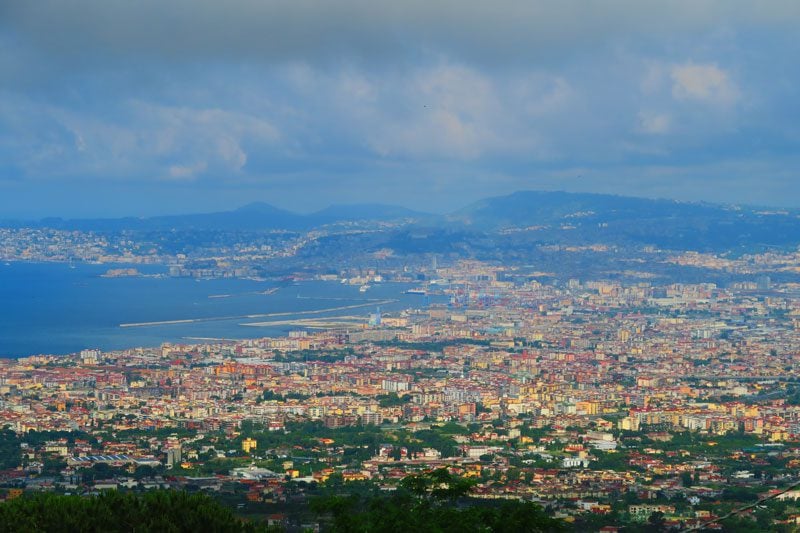
However, the road doesn’t go all the way to the top. At some point, you’ll reach the upper car park. You can then either pay a small fee to be driven to the ticket booth (purchase your ticket in advance) or climb on foot for about 15 minutes (the public bus goes all the way to the ticket booth). Reaching the crater rim takes about 20 minutes of climbing. The climb itself is not difficult at all, but it is dusty (so wear show), and it will get chilly (and perhaps wet) if it’s an overcast day.
Peaking through the massive crater is pretty impressive, but the real highlight is the view of Naples and the gulf from the summit, something we didn’t get to enjoy during our visit due to the bad weather…
Pompeii
On August 24 in the year 79 AD, the Roman city of Pompeii was wiped out by a massive eruption of Mount Vesuvius. At the time, Pompeii was a major center of commerce in the Roman Empire, and its destruction was tragic. The ruins of Pompeii were first discovered in 1600, but excavations only began in 1748. In fact, they are continuing to this very day. Over the years, archaeologists have made chilling discoveries of residents and their pets frozen in time in layers of volcanic ash that have preserved their final postures.
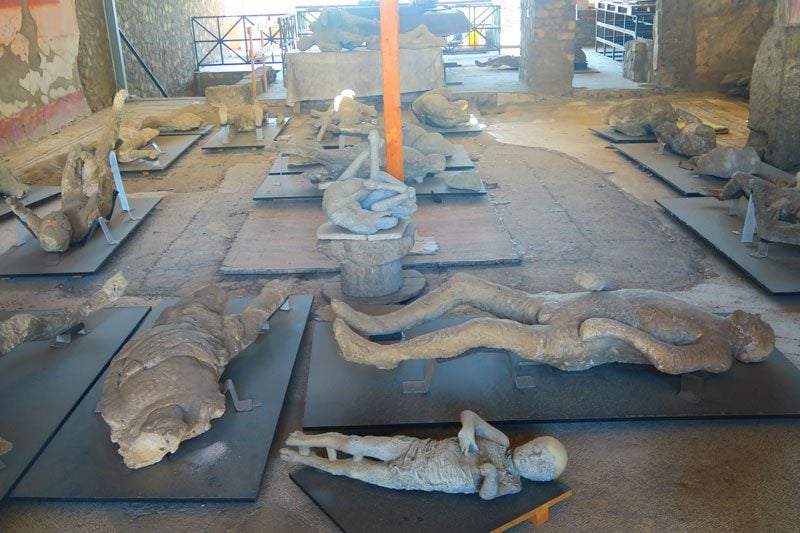
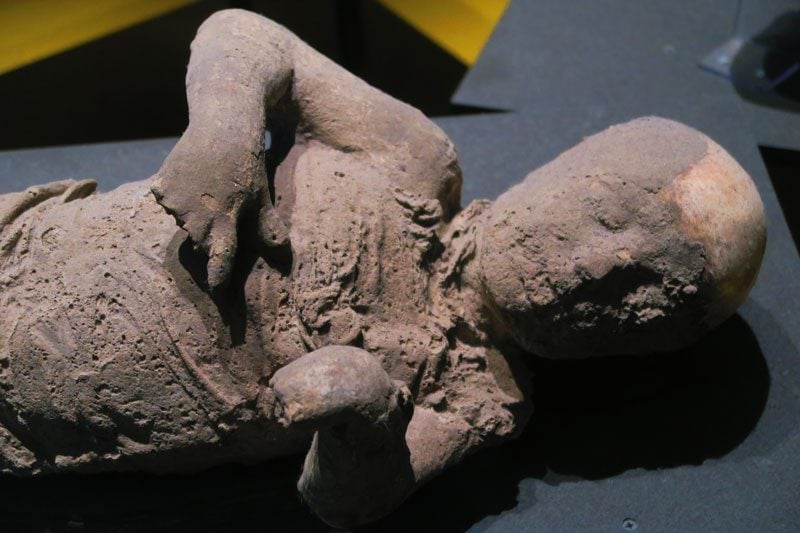
Pompeii is a huge attraction to take in, and it can easily consume half of your day. However, we spent a couple of hours strolling around, and it was more than enough. We got the point and were super impressed but were ready to move on.
You can visit Pompeii on a guided tour from Naples. If you have a car, note that you can enter the site from two gates, but it’s the Marina Gate that you want to plan for. There are a handful of restaurants lining the main avenue, and some might let you park for free if you grab lunch, which we found to be a good option. Purchase your Pompeii tickets in advance and avoid having to wait in line.
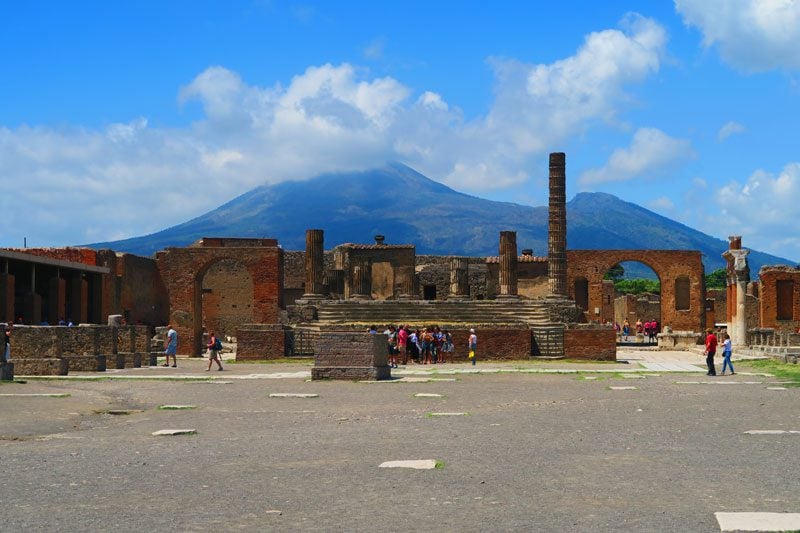
Once inside, we strolled straight in the direction of the forum, which was essentially “the downtown” of Pompeii. We took in the various highlights around the forum, including the mosaics, bathhouses, and what seems like the remains of humans and animals but are really the contours of volcanic ash that covered the poor souls who did not flee the ancient city. The only missed Pompeii highlights that were on our list were the amphitheater and the grand palace, but they were on the far end from the forum, and we really wanted to hit the road and finally hit the Amalfi Coast.

The newly restored Casa dei Vettii in Pompeii opened for visitors in early 2023. The former mansion displays a beautiful interior that’s worth checking out.
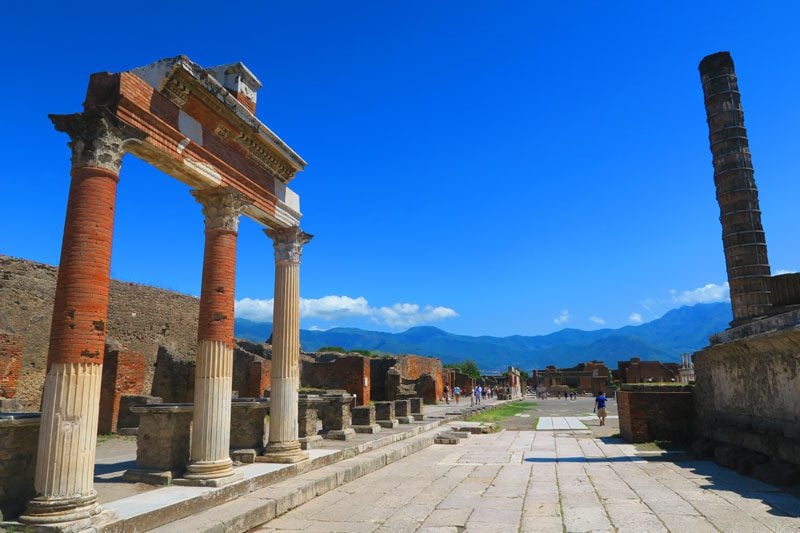
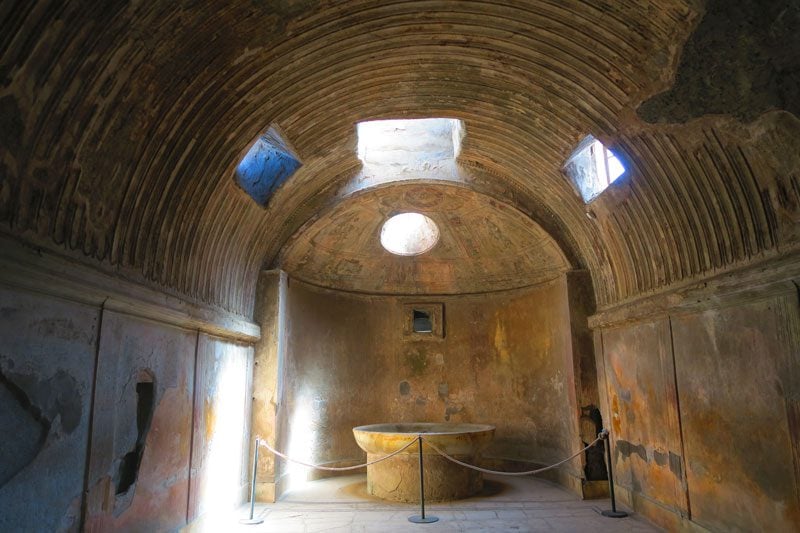
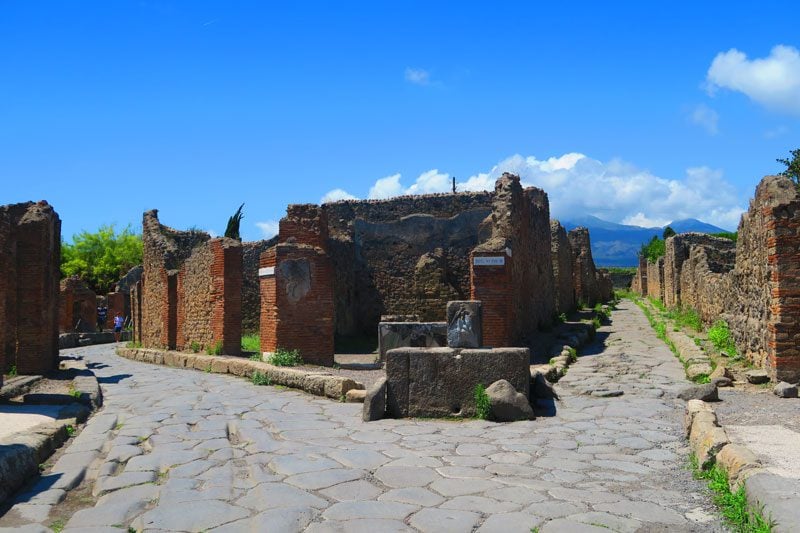
If you’re interested in the subject, consider combining your Pompeii visit with a tour of Herculaneum. Slightly closer to Naples than Pompeii, this site is a lot less crowded than its more famous neighbor. In 2024, an ancient beach on the present-day site opened to the public after years of restoration work.
Drive to the Amalfi Area
The anticipated drive from Pompeii to our Amalfi base for the next three nights was incredible. The drive becomes challenging and exhilarating once you leave the coast and enter the mountains. The views are spectacular; if you’re not in a hurry, take the time and make a few stops.
We stopped at a lookout near the village of Agerola, inside the Parco Regionale dei Monti Lattari. The views from up here are the views we were dreaming of when planning our vacation on the Amalfi Coast.
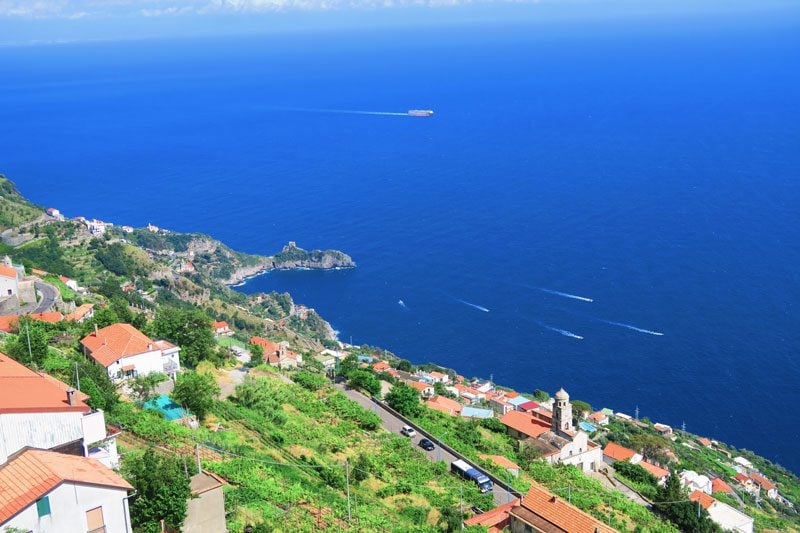
As you continue the drive, man’s victory over nature is absolutely mindblowing. The entire scene on the Amalfi Coast looks like a children’s game of “snakes and ladders”. Rows upon rows of lemon and olive trees blanket the contours of fertile hills, and small vertical footpaths lead from homes clinging to the hillside down to cultivated plots of land.
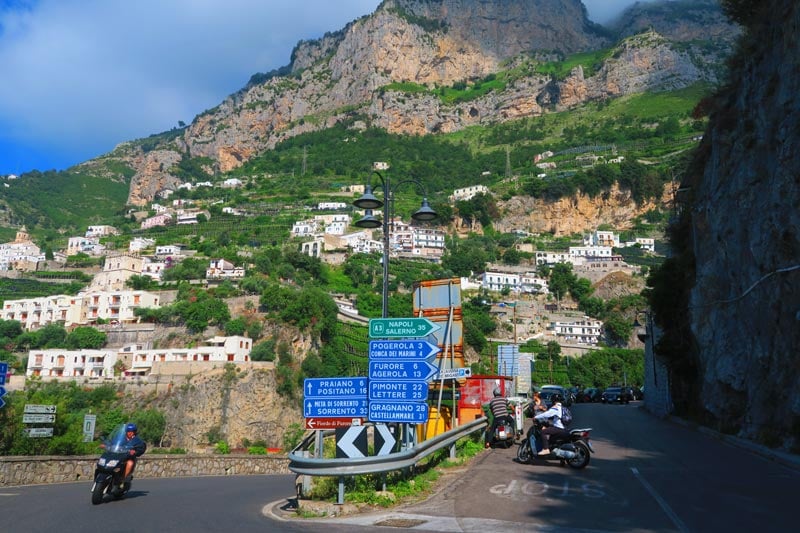
Such a “collision” between man and nature has surely yielded the highest per capita ratio of steps to residents, not to mention locals with extremely strong leg muscles, regardless of what is happening around the waist. This seemingly inaccessible area poses a challenge for tourist drivers, perhaps the reason for the constant boat traffic going up and down the coast.
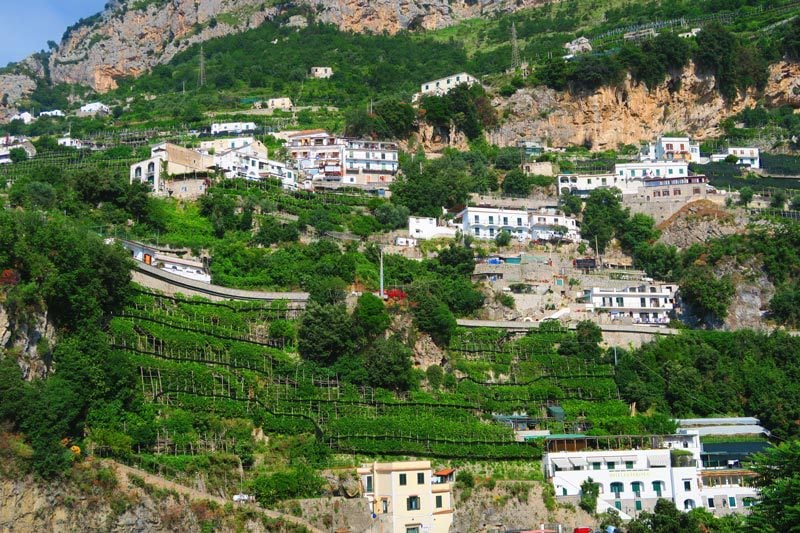
Where to Stay in The Amalfi Area?
The answer to that is to actually not stay in Amalfi. The famed village is overcrowded with tourists, not to mention with cars. Instead, stay in the village of Ravello or at the gem of a place that we found called World Center Resort. Located in the countryside, about 10 minutes by car from Amalfi, this is the ideal location with stunning coastline views. Units have been recently renovated, and their layout provides privacy.
Breakfast is generously served in the beautiful garden, and if you need any extra services, such as a ride to and from Amalfi or a lift to the start of the Path of the Gods trailhead, that can be arranged on the spot. The only downside at the World Center is the lack of mosquito screens on the windows (but there is air conditioning).
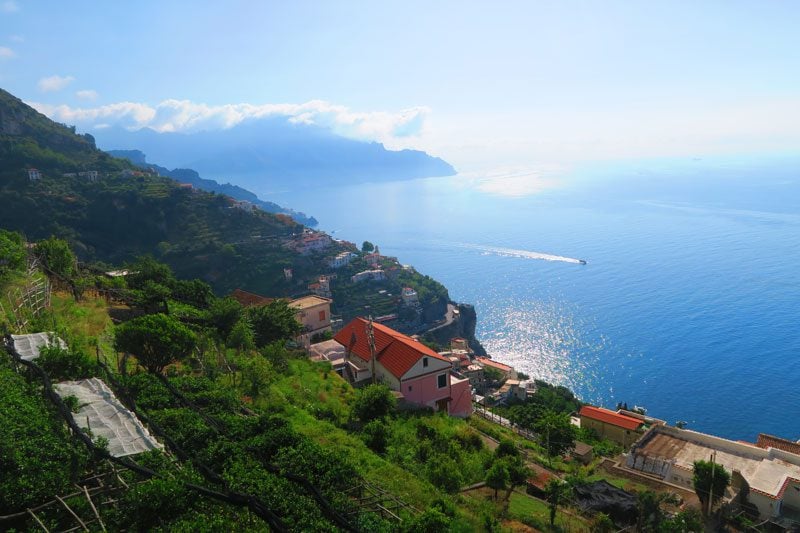
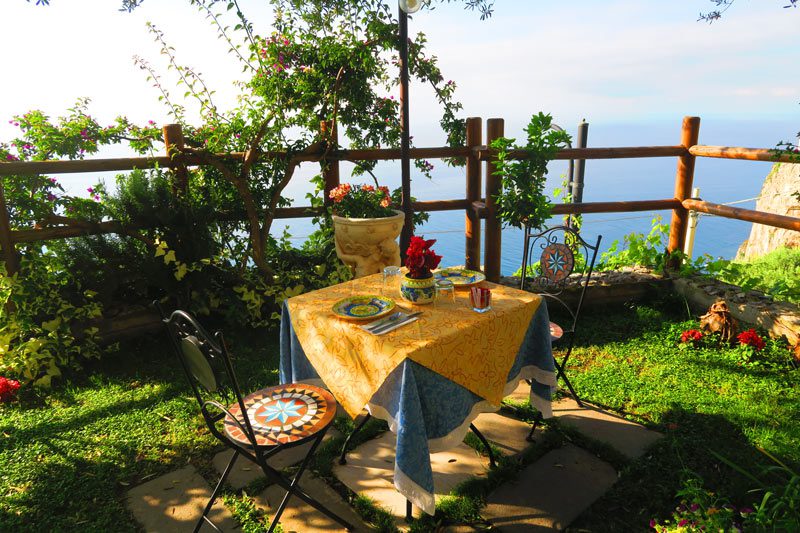
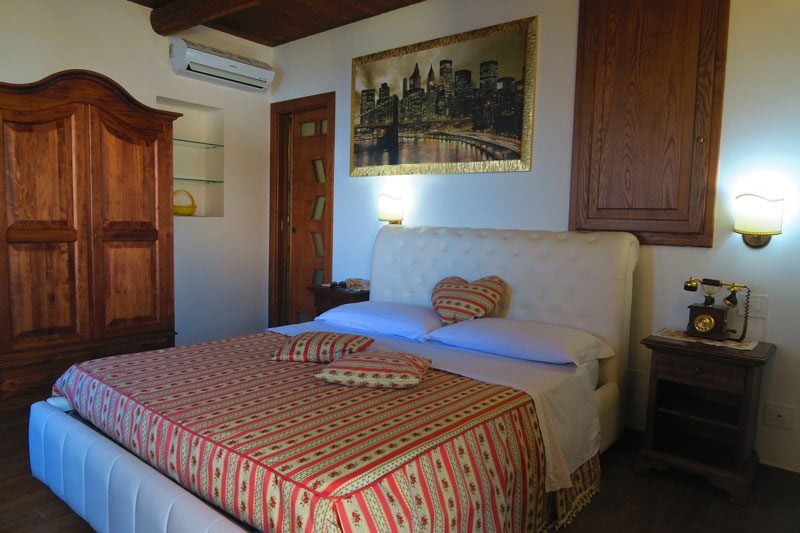
Dinner
Our first dinner on the Amalfi Coast was at Le Bontà del Capo in the village of Conca dei Marini. We came here at a friend’s recommendation, and it was our best dinner on the Amalfi Coast. It’s amazing just how good the food was and how reasonable the price was. We sampled some local wine to go along with octopus and Caprese salad to start things off. For mains, we had fish ravioli and grilled seabream. And for dessert… tiramisu, of course. Reservations are essential, and I recommend asking for an outside table right on the terrace. Even in June, it might be a bit chilly in the mountains, so bring something warm just in case.
